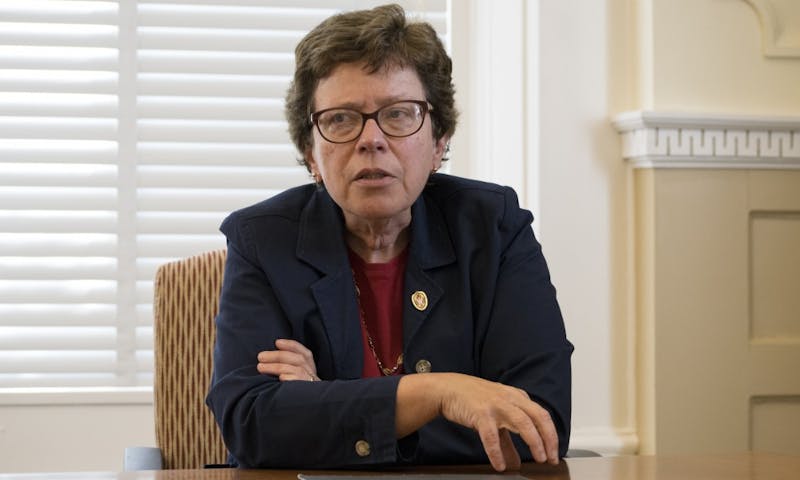
Chancellor Rebecca Blank said Wednesday that her hopes were high that students would be able to return to campus in the fall.
Image By: Cameron Lane-Flehinger
Chancellor Rebecca Blank said Wednesday that her hopes were high that students would be able to return to campus in the fall.
Image By: Cameron Lane-FlehingerUW-Madison will have a three-part testing program in place when students return to campus in the fall, according to Chancellor Rebecca Blank.
Blank told a Greater Madison Chamber of Commerce briefing today the university will first set up free testing sites around campus for anyone in the community to use. Then, it will conduct wide-range surveillance testing in the surrounding community to monitor for potential hotspots or outbreaks, as well as practice targeted testing for students in dorms and athletics.
“We want to be able to tell students that campus is actually a safer place for them than the outside world,” Blank said. “Our goal is to make sure the university stays that safe for the entire semester.”
Targeted tests in dorms and sports facilities will be conducted at least once every two weeks, with immediate containment and quarantine protocols in place in the case of a positive test.
Creating a more inclusive environment
Blank said she did not take the decision to reopen on a hybrid model of instruction lightly, but that it is necessary to have a “properly functioning flow of thought” at the university. She said that much learning on campus happens when peers collaborate, and that online school does “students a disservice” by not offering those opportunities.
Blank also noted the university is looking for ways to become more “welcoming and open” for students of color.
UW-Madison has already mandated a new “Diversity Framework” course for all incoming students — similar to the GetWIse workshops required for alcohol and drug use — that will “promote shared values of diversity and inclusion” among other issues. The university has also launched a $10 million fundraising campaign that will provide scholarships and financial aid to students and faculty of color.
“For white people like me there is a window of opportunity now that we have never had before,” Blank said. “White students and faculty need to reflect on our own behaviors and actions every day. If we do not seize this moment to listen, understand and change then shame on us.”
Financial concerns
Blank touched on the UW-System’s financial future due to the pandemic and said short-term cash flow issues may be exacerbated by the possibility of fall sports being cancelled.
“Short-term, we are going to have a few problems,” Blank said. “To make it worse — though I can’t say with certainty — if I had to guess there is under a 50 percent chance sports play in the fall.”
This comes a week after the Big Ten’s announcement of implementing a conference-only schedule for the Fall 2020 season.
Even if Badgers are on the schedule, fan attendance would be heavily restricted if allowed at all.
“If you’re a fan of volleyball, I’m sorry but there won’t be fans,” she said. “The worst environment for this virus is an enclosed space with lots of people yelling.”
However, Blank said the university could probably withstand a year of very low revenue because of extra cash reserves. The real problem, she said, is the state and federal budget cuts to higher education.
Over the course of decades, the state legislature has reduced the UW-System’s funding and authority to autonomously manage its own budget. The UW System is currently the only state flagship system in the country that has no borrowing authority, which Blank said has a huge impact on education down the road.
“Once we’re finally starting to get out of this next year, we will be right back in the middle of [a] financial crisis,” she said. “State budget cuts are going to put us significantly in the red, and we do not have the power to take out loans without the Legislature's approval.”
Blank said it could lead to faculty cuts or other programs losing a significant amount of their funding.
“The best thing the state can do is to deregulate the university; we have a long road ahead and it would prevent a lot of financial hardship.”